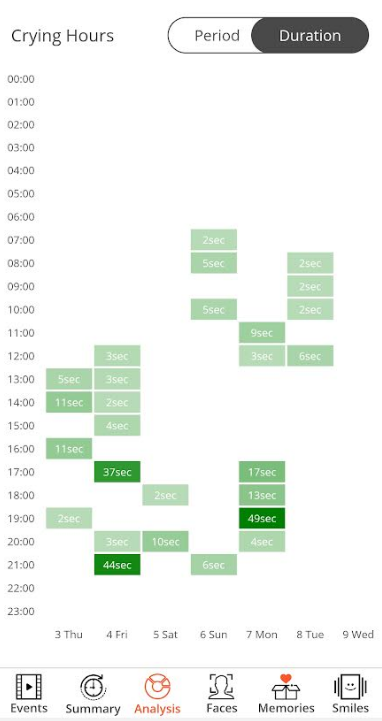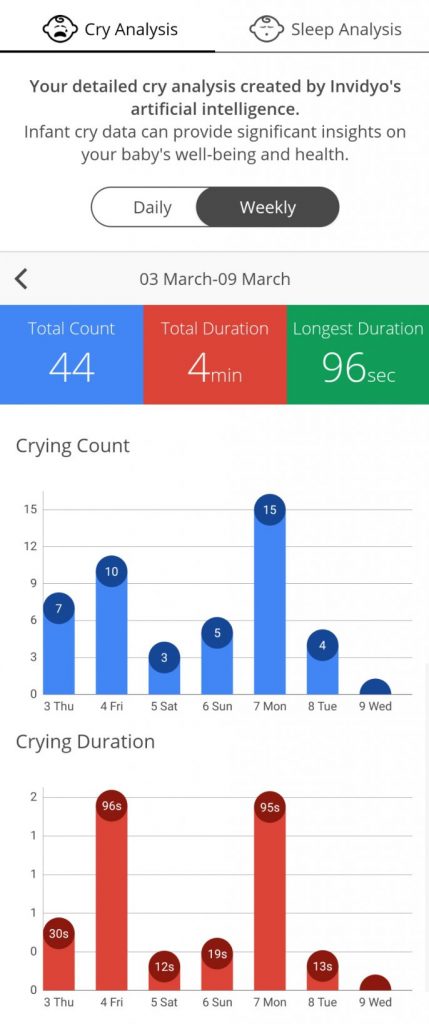Babies cry. We all know that. Whether new or not, parents already expect long bouts of tantrums and tears. But, even for us parents, the crying can get a bit much sometimes. If you are experiencing an extra fussy baby, chances are you have a colicky newborn on your hands.
If you have never heard of colic before, that is alright. A lot of parents are not familiar with the term or condition. So, let’s get right into it!
Table of Contents
- What Is Colic
- Who Gets Colic
- When Does Colic Start
- How Long Does Colic Last
- Difference Between Colic & Normal Crying
- What Causes Colic
- What To Rule Out
- Colic Signs & Symptoms
- Colic Diagnosis
- Colic Prevention
- Colic & Diet
- Colic Treatment
- Medication for Colic
- Complications Of Colic
- My Baby Just Won’t Stop Crying
- When To Call A Doctor
- How To Deal With Colic Stress
- Where Can You Seek Help
What Is Colic
Colic is when your infant cries for longer than 3 hours a day. This pattern continues daily, exceeding 3 days a week, pushing 3+ more weeks. If you start noticing this pattern, your baby has colic.
With the passage of time, you will notice that this period begins to shorten. The three-hour-long crying fits will reduce to two and then one until it disappears completely.
ALSO READ: How do you Calm a Crying Baby in 5 Seconds? A Step-by-Step Tutorial
Who Gets Colic
Prematurely born infants have a higher chance of being colic. However, that is not a rule. Every baby can get colic. It truly does not matter what gender, birth order, or feeding method your baby follows. Whether you choose breastfeeding or bottle feeding, it will not affect your baby’s chances of becoming colic.
On the bright side, though, having colic does not affect your baby’s development in any way. However, how you deal with a colic newborn will affect their growth.
When Does Colic Start
If you have a premie on your hands, colic can start as early as 2 weeks of age. However, the average age at which babies usually become colicky is 3 weeks old. Between the ages of 4 and 6 weeks, parents can expect a full-blown colicky experience.
As far as the time of day is concerned, colic usually makes an appearance around or after 6 PM in the evening. This continues until about midnight. So essentially, just when it is time for you to end the day and unwind, colic strikes. This one of the main reasons why dealing with colic can be quite exhausting and frustrating.
How Long Does Colic Last
Colic disappears all on its own after 3 or 4 months. So, essentially, parents just have to wait this period out. Sometimes, it can take longer to subside with parents dealing with up to 6 months of colicky babies. We, as parents, understand how frustrating and taxing this period can be. That is why we are determined to help you navigate this difficult period.
By the age of 12 weeks, you can expect your baby to have completely recovered from colic. Because of how tiny babies are in the first few months, dealing with colic is that much more difficult. Infants will need constant attention and care to keep them calm and soothed.
Difference Between Colic & Normal Crying
Normally, crying is an indication of something wrong. Maybe your baby is uncomfortable or needs food or a diaper change. With colic, there is never an apparent reason behind why your child is crying.
Colic crying is usually louder and far more high-pitched than normal crying. It sounds urgent. And it can be very difficult to calm a colicky baby down. Colic presents itself in a particular pattern that you will soon begin to recognize.
Colic spells:
- occur at the same time every day
- are characterized by high-pitched screaming and crying
- result in pale or red-faced baby
- can cause stiffness in limbs
- may cause baby to clench their muscles, limbs or fists
What Causes Colic
As a condition, colic has and continues to baffle experts. They cannot seem to understand why it happens. There is no definitive cause or explanation for it. The best guess we can work with is that colic indicates that your baby is extra sensitive to stimuli.
This means that your infant’s nervous system is not fully mature yet. Hence, your child cannot self-console. This can result in a very demanding child in constant need of comfort, attention, and reassurance.
What To Rule Out
Of course, since colic only presents itself as crying, it can be tricky to navigate it. It is common to become concerned and try to find the underlying cause of crying. Is my baby sick? Is my baby in pain? Parents usually struggle to identify colic.
So how do you decide if it is actually colic that your baby is suffering from? There are a few things you can rule out to determine if you have a colic baby. Since colic conditions can look a lot like a multitude of other illnesses, look out for:
- A fever
- An infection
- Stomach problems or acid reflux
- Overfeeding or underfeeding
- Dietary sensitivities (applies to breastfed and formula-fed babies)
- Any signs of inflammation
- An uneven or irregular heartbeat
- Injuries or soreness in any particular areas
If you notice any of these symptoms, take your infant to a doctor immediately. If these symptoms are not present, then you are dealing with colic.
Colic Signs & Symptoms
One of colic’s most important signs and symptoms is a repetitive crying pattern. Your baby’s crying will begin around the same time every day. You will also notice:
- No visible causes for crying, such as hunger or a dirty diaper
- No signs of pain or discomfort
- Strained muscles and rigid limbs
- Reddening of the face
- Swollen or tight belly (this is caused by the ingestion of air while crying)
Colic Diagnosis
Colic can be diagnosed by answering a few simple questions. If you take your child to a specialist, they will most likely ask you:
- How often does your baby cry?
- How long do the crying spells last?
- Is there anything that triggers the crying episodes?
- How do you comfort your baby, and what works?
Your doctor will also conduct a physical exam. In more extreme cases, the doctor might conduct some tests to rule out any underlying conditions. This is all part of due process and should not be a cause of concern.
During the physical exam, some things that your doctor will focus on include:
- Weight and growth progress
- Temperature levels and heartbeat
- Energy levels
- Breathing patterns
- Skin tone
It is important to remember that a specific test for colic does not exist. The physical examination and/or tests carried out by the doctor only serve to rule out any health concerns.
Colic Prevention
Is there anything I can do to prevent colic? Truth be told, no single measure has proven effective in preventing colic. Although some parents and families swear by foolproof means of preventing colic, no credible research exists to authenticate that.
It is important to remember that your baby is healthy and developing well. Surely, if your child shows no signs of illness or disease, that is a relief. Besides, crying does not leave any permanent side effects. It is simply a phase that will pass in a matter of weeks.
You should remember that responding to your baby and communicating with them is essential. Be consistent and prompt with your response to your child’s crying. Colic subsides all on its own around the age of 4 months. In extreme cases, this can go up to 6 months but not longer.
Colic & Diet
Sometimes, your baby might experience sensitivities to their diet. If you are breastfeeding, colic might indicate your baby’s sensitivity to your diet. Even when formula feeding, your baby might not respond favorably to some types of formula. You can try and switch up your diet or change the formula you are using,
Some mothers have noticed that consuming spicy or gassy foods contribute to colic. If you are breastfeeding, pay close attention to your diet. Watch what you consume daily and the effect it has on your baby. Sometimes, eliminating or adding particular foods can soothe your baby and reduce the crying fits.
ALSO READ: Does Cry it Out (CIO) Cause Damage?
Colic Treatment
Just like no known prevention method for colic exists, there is no proven treatment method either. However, that is not to say there aren’t some methods and techniques to relieve colic symptoms. The main goal is to soothe your baby and for that, various interventions work.
How To Relieve Colic Symptoms
Since the main idea is to soothe your baby, there are many ways you can attempt to do that. You might need to create a simple plan to help you do so. Some methods work better than others. It all depends on how you choose to execute these steps. Moreover, some babies respond better to particular techniques as opposed to others.
Some colic soothing strategies you might want to consider include:
- Using a pacifier – A lot of parents already use pacifiers. A neat hack you might want to consider would be to stuff a piece of soft ripe fruit (e.g. mango or banana) inside the pacifier. This helps keep the baby’s attention focused on the pacifier. Don’t worry about food particles, as pacifiers are designed to only allow the tiniest amount of food to pass through at once.
- Take your baby out – A change in scenery is always a great idea. It gives you the time and opportunity to unwind. It also works well in distracting your baby. You can go for a walk around the block and push your baby around in a stroller. You can also go for a drive. Ensure you have a proper baby car seat installed and that your infant is safely and securely strapped in before you begin.
- Rocking or swaying – Holding your baby close is a great strategy to soothe them. It can lull your baby to a calmer state when coupled with gentle rocking or swaying. You can also choose to do this with skin-to-skin contact as well. Just be sure to do so in a warm environment, so your baby does not catch a cold.
- Swaddling – The main purpose of a swaddle is to replicate the warmth and comfort of the womb. Essentially, you use a soft blanket and tightly wrap your baby up in it. This also doubles as a hug and gives your child a sense of comfort similar to being held. If you don’t know how to prepare a swaddle, you can learn using these helpful tips.
- A warm bath – Even as adults, we know nothing comes close to the comfort of a warm bath. Not only will this soothe your baby’s nerves but also calm them down. You can use essential oils such as lavender or jojoba as well. Or you can choose baby-safe products for the bath. Feel free to join your little one in the bathtub if it makes things easier for the both of you.
- Tummy or back rubs – Colic is sometimes induced by or even causes the buildup of gases in the stomach. A gentle belly or back rub should help your baby release those trapped gasses. You can do that while your baby is lying down (face up or down) or while carrying them against your shoulder. Gas or not, in either case, it is still a gentle massage that should calm them down.
- Lullabies or white noise – Using lullabies, melodies, or a white noise machine can greatly improve your baby’s mood. Invidyo’s Baby Cam is a wonderful choice as it allows you to play white noise, melodies, lullabies, or even sing or speak to your child through its two-communication system. So even if you are away, you can rely on Invidyo to look after your colic baby.
- Reducing stimulation – Perhaps the lights are too bright, or there is too much noise coming in from the street. Try and reduce sources of overstimulation. Dim the lights in the nursery and make sure there isn’t a lot of noise nearby. Colic due to overstimulation is far more common than you would think.
Dealing With Overstimulation
Overstimulation is pretty common in babies. Life in itself is inherently stimulating. It is the experience of one stimulus after the next. Because babies are new to the world, everything is just that much more stimulating for them. By the end of the day, your baby is bound to be exhausted by all the new sounds, sights, and experiences they have undergone. This results in being overstimulated and overtired.
This is a difficult state to deal with. In this state, your baby’s brain is flooded with cortisol – the stress hormone. This stimulates the sympathetic nervous system, which triggers a fight or flight response. Your baby will begin experiencing an elevated heartbeat, stiff muscles and rapid breathing. As a response to this level of stress, babies communicate or vent through crying.
So how can you tell that your colic baby is overstimulated? There are a few signs that babies exhibit when they are overstimulated.
Look out for:
- Lack of eye contact
- Yawning
- Glazed eyes
- Hiccups
- Disorganized body movement
- Crying and fussiness
- Paleness
- Eye rubbing
Note that all these signs might not exhibit all at once or altogether. However, just 2-3 of these should be enough to alert you that your baby is experiencing overstimulation.
ALSO READ: Signs of Stress in Babies: How to deal with it?
Preventing Overstimulation In Colic Baby
Parents are usually quick to buy fancy and colorful toys for their babies. And they are also quick to use them as a distraction when their baby is crying or fussing. But, if you suspect overstimulation, avoid anything meant to attract or absorb all of their attention. Instead, try and do the following:
- Gentle singing – using your natural voice in a low and calm tone, sing to your baby
- Hold baby’s gaze – get close to your baby and hold their gaze while smiling
- Step outside – going out in nature helps reduce overstimulation in babies
Soothing An Overstimulated Colic Baby
Some of the best advice to follow when attempting to soothe an overstimulated colic baby is to reduce all nearby stimuli. Move away from light and noise sources. Isolate yourself with your baby in a dim and quiet room. Turn off the television or any background music. While holding your baby, deliberately breathe deeply and slowly. Your baby will begin imitating you soon. This deliberate pattern helps activate the brain to enter a calmer state and also improves blood flow and digestion.
Other Ways To Comfort A Colic Baby
Have you heard of the 5 S’s? These are 5 simple techniques that instantly work to comfort your baby. You can pair a couple of them together as well, for the best results. So what are the 5 S’s? These stand for:
- Swaddling
As mentioned earlier, a good swaddle will help your baby feel held, hugged, and soothed. Pairing that with a hug around the upper body will work wonders. - Shushing
Gentle shushing will usually work to calm your colic baby down. Your baby is already used to your voice; hearing more of it greatly helps them relax. This is especially true if you use your voice in a calm and controlled manner. - Swinging
Hold your baby and gently rock them. It does not have to be very pronounced or dramatic. A gentle swinging or swaying will usually do the trick. - Sucking
Since babies already have a strong sucking instinct, they rely on sucking to soothe themselves. If your baby is not hungry and needs to be fed, use a pacifier. Giving them something to suck on will draw their focus to the sucking action. It will also keep them busy enough to not cry. - Side/Stomach Lying
A little-known fact that most parents are unaware of is how easy it is to comfort a baby lying on their side. Even if you are carrying your baby, position them on their side and proceed to console them. Don’t forget that it is dangerous to put a baby to sleep on their side or stomach and that may lead to SIDS or Sudden Infant Death Syndrome.
It is important to remember that every baby is unique in its own way. Some babies respond better to some methods and outright reject others. You must find the happy balance that works for your baby. Some babies must be swayed while others calm down without any swinging. So, remember to experiment until you find what works for you and your baby.
Medication for Colic
Quite simply put, there is no medication for colic. Since colic continues to baffle experts, doctors, and professionals, medications for the condition do not exist yet. According to Maureen Keefe, RN, PhD, founder of the Fussy Baby Clinics in Denver, Colorado, and Charleston, South Carolina, parents tend to give up trying to soothe and calm their babies pretty fast. Perseverance is key, especially if you are dealing with a colicky newborn.
Some ways that you can help your colicky baby include:
- Making sure that your baby’s needs are met i.e. hunger and a diaper change
- Inducing burps through gentle back and stomach rubs
- Rocking or walking with your baby
- Changes in mother’s diet if you are breastfeeding (cutting dairy, caffeine, spicy foods. soy, eggs and wheat has been found to help)
- Changing the feeder if your baby is bottle-fed
- Singing or talking to your baby
- Playing gentle music
- Using a pacifier
- Gently hugging your baby
- Going for a drive
Colic is a difficult experience, without a doubt. However, as a parent, you must also understand that it is equally difficult for your baby. That is why you should exercise patience, care, and diligence when dealing with your colicky baby. This is not to say that you should neglect yourself. We also have some wonderful tips for parents on how to take care of themselves during this difficult period.
ALSO READ: 5 Reasons for newborn baby crying: Can they cry for no reason?
Complications Of Colic
As far as your baby is concerned, colic does not present any short-term or long-term side effects. However, for parents, colic can be quite stressful to deal with. In fact, all and any complications that arise from colic are directly related to parents and caregivers.
According to research, colic has a strong association with the following:
- Early breast-feeding cessation
- Heightened feelings of stress, guilt, anger, frustration or even anger
- Increase risk of post-partum depression in mothers
- Marital distress
Read on to find out how to deal with colic stress and where you can seek help to deal with a colicky baby.
My Baby Just Won’t Stop Crying
Whatever happens, do not shake or express violence towards your baby. Infants are fragile beings and being shaken or treated roughly can cause serious damage. In extreme cases, this can affect their brain and even result in death. Yes, sometimes it can all get a bit much to deal with. Your colicky baby just won’t stop crying.
Invidyo Is Here To Help
This is where Invidyo comes in. Invidyo’s Smart Cry Detection and Alerts help you determine if your baby has colic. The app displays a detailed graph of when your baby cried by the hour. The data is displayed based on Crying Periods and Crying Durations.

Parents can also choose to select the particular crying session and watch the corresponding recorded video of their baby crying. This is a great way to understand what is troubling your baby and better detect colic symptoms.

Read more about Invidyo’s Smart Cry Feature and why parents love it!
Invidyo’s Baby Cam also grants you the freedom of taking some time and space for yourself without neglecting your baby. Being your eyes and ears when you are away, Invidyo helps you maintain communication with your baby even when you are physically away.
The incredible two-way communication feature allows you to hear your baby and also talk to them. You can also use the Baby Cam to play lullabies, melodies, and white noise straight from the app. Simply install Invidyo in your nursery to watch your baby at all times. The Cam will detect any motion and record it for you. It will also monitor and record any noises.
Besides, it’s 360° remote pan and tilt feature allows you to watch every corner of the nursery at all times. So whenever you need to step away and gather yourself, you can rely on Invidyo Baby Cam to have your back.
When To Call A Doctor
Babies can only communicate through crying. And while you are dealing with colic, there will be a lot of crying. However, don’t let this thought distract you from noticing any real issues that may arise. Consider calling a doctor immediately if you notice:
- High body temperature or fever
- Inability to calm down no matter what you do
- Vomiting
- Weight loss
- Lack of weight gain (maintaining the same weight)
- Poor sucking or feeding
- Blood in stool
- Loose stool or diarrhea
- Lack of activeness or energy
- Disinterest in feeding
ALSO READ: Baby Wakes Up Crying Hysterically at Night
How To Deal With Colic Stress
One of the most important things to remember when dealing with colic is that you, as a parent, need to take a break. Constantly being around your colic baby and soothing them will take a toll on you. Remember to take time out and away from everything so you can calm down. If you are not in great mental and physical shape, you cannot be present for your baby.
Get in the habit of expressing your feelings to your loved ones. Whether it is friends or family, talking about things helps alleviate your tensions. Sometimes even talking to your baby’s doctor can help. If you find it necessary, consider seeking therapy as well.
Another great piece of advice is to be gentle with yourself. Do not judge yourself. Your success is not measured by how less your baby cries, how many ounces you produce, or how long your baby sleeps. Your baby is a whole other human being with their own mind, body, and feelings. It is unfair to expect them to behave exactly how you want them to.
It is also important to remind yourself that this is all temporary. Colic is temporary. And while it can get too much at times, find relief in the fact that this too shall pass. It helps if you have a backup plan for when things get too much. Whether you are exhausted, tired, or overwhelmed, as soon as you need a timeout, make sure you have someone to count on. This can be a nanny, neighbor, friend, or family member. Regardless, you should have a trusted person you can call on in times of need.
Where Can You Seek Help
There are plenty of colic support groups, both online and in-person. Talk to other parents and mothers and discuss your worries with them. Do not shy away from asking for or accepting help. It is a difficult time and every parent knows how much toll it can take on you. Getting support helps you maintain your sanity and health. Connecting with other parents will provide you with insight as well as support.
It is easy to convince yourself that you are the only one in this struggle. But the truth is, you are not alone. There are more parents struggling with colic than you know. And this can only get better if more parents talk about it and discuss it openly.
•••
Invidyo is a Smart AI Powered Baby Monitor designed to help parents watch over their baby at all times. It offers contactless monitoring, cough and cry detection, stranger alerts, and intuitive data analysis to inform parents about their baby’s health and wellbeing.
Subscribe to the Invidyo Care Bundle for $20/month and get a FREE Invidyo Baby Cam!










